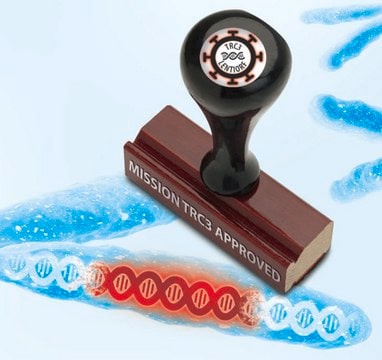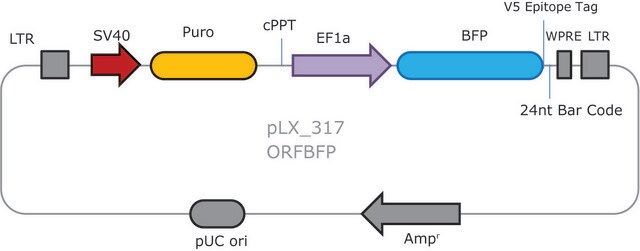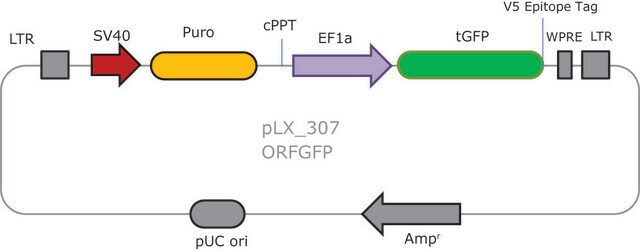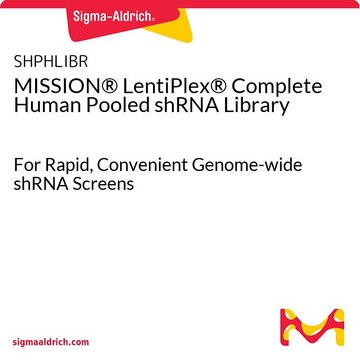ORFBFPH
MISSION® TRC3 ORF BFP Lentivirus High Titer Control
Zaloguj sięWyświetlanie cen organizacyjnych i kontraktowych
About This Item
Kod UNSPSC:
41106609
NACRES:
NA.51
Polecane produkty
opakowanie
vial of 200 μL
Poziom jakości
stężenie
5x108 VP/ml (via p24 assay)
Zastosowanie
genome mapping
genomic analysis
Warunki transportu
dry ice
temp. przechowywania
−70°C
Powiązane kategorie
Opis ogólny
The MISSION TRC3 ORF BFP Lentivirus High Titer Control Transduction Particles contain an ORF insert expressing BFP, and is useful as a positive (or negative control) in experiments using the MISSION TRC3 LentiORF Library Collection in arrayed or pooled format, including our latest Whole Genome LentiORF Pool.
The BFP ORF control transduction particles are produced from the sequence-verified lentiviral plasmid, pLX307-puro-BFP (ORFBFP). This positive control can be used for measuring transduction efficiency and optimizing ORF delivery in cell lines that do not survive any puromycin exposure. The BFP Control contains a gene encoding BFP driven by the EF1a promoter. This control provides fast visual confirmation of successful transduction. Ampicillin and puromycin antibiotic resistance genes provide selection in bacterial or mammalian cells respectively.
Unlike murine-based MMLV or MSCV retroviral systems, lentiviral-based particles permit efficient infection and integration of the construct into differentiated and non-dividing cells, such as neurons and dendritic cells, overcoming low transfection and integration difficulties when using these cell lines. Self-inactivating replication incompetent viral particles are produced in packaging cells (HEK293T) by co-transfection with compatible packaging plasmids.
In addition, the Control Transduction Particles are pseudotyped with an envelope G glycoprotein from Vesicular Stomatitis Virus (VSV-G), allowing transduction of a wide variety of mammalian cells. 200 μl of 5x108 TU/ml (via p24 titering assay) lentiviral particles are provided as frozen stock.
This high titer offering is recommended for customers: who need to utilize smaller volumes of virus, who have very difficult to transduce cell lines, or who need to transduce large numbers of cells.
When conducting experiments using MISSION TRC3 ORF clones, the proper controls should be a key element of your experimental design to allow for accurate interpretation of gene and protein expression results. The MISSION Control Transduction Particles are a critical positive control to monitor transduction efficiency.
To see application data, protocols, vector maps, and more visit the TRC3 Information Page
The BFP ORF control transduction particles are produced from the sequence-verified lentiviral plasmid, pLX307-puro-BFP (ORFBFP). This positive control can be used for measuring transduction efficiency and optimizing ORF delivery in cell lines that do not survive any puromycin exposure. The BFP Control contains a gene encoding BFP driven by the EF1a promoter. This control provides fast visual confirmation of successful transduction. Ampicillin and puromycin antibiotic resistance genes provide selection in bacterial or mammalian cells respectively.
Unlike murine-based MMLV or MSCV retroviral systems, lentiviral-based particles permit efficient infection and integration of the construct into differentiated and non-dividing cells, such as neurons and dendritic cells, overcoming low transfection and integration difficulties when using these cell lines. Self-inactivating replication incompetent viral particles are produced in packaging cells (HEK293T) by co-transfection with compatible packaging plasmids.
In addition, the Control Transduction Particles are pseudotyped with an envelope G glycoprotein from Vesicular Stomatitis Virus (VSV-G), allowing transduction of a wide variety of mammalian cells. 200 μl of 5x108 TU/ml (via p24 titering assay) lentiviral particles are provided as frozen stock.
This high titer offering is recommended for customers: who need to utilize smaller volumes of virus, who have very difficult to transduce cell lines, or who need to transduce large numbers of cells.
When conducting experiments using MISSION TRC3 ORF clones, the proper controls should be a key element of your experimental design to allow for accurate interpretation of gene and protein expression results. The MISSION Control Transduction Particles are a critical positive control to monitor transduction efficiency.
To see application data, protocols, vector maps, and more visit the TRC3 Information Page
Zastosowanie
Functional Genomics/Overexpression Screening/Target Validation
Uwaga dotycząca przygotowania
Puro Kill Curve and Determining CFU (Colony Formation Unit) per mL. Prior to performing a library-scale screening, two preliminary experiments must be conducted. Visit the Lentiviralpool Information Page or refer to the technical bulletin.
Informacje prawne
Use of this product is subject to one or more license agreements. For details, please see the MISSION License Page
MISSION is a registered trademark of Merck KGaA, Darmstadt, Germany
Ta strona może zawierać tekst przetłumaczony maszynowo.
produkt powiązany
Numer produktu
Opis
Cennik
Kod klasy składowania
12 - Non Combustible Liquids
Klasa zagrożenia wodnego (WGK)
WGK 3
Temperatura zapłonu (°F)
Not applicable
Temperatura zapłonu (°C)
Not applicable
Certyfikaty analizy (CoA)
Poszukaj Certyfikaty analizy (CoA), wpisując numer partii/serii produktów. Numery serii i partii można znaleźć na etykiecie produktu po słowach „seria” lub „partia”.
Masz już ten produkt?
Dokumenty związane z niedawno zakupionymi produktami zostały zamieszczone w Bibliotece dokumentów.
Nasz zespół naukowców ma doświadczenie we wszystkich obszarach badań, w tym w naukach przyrodniczych, materiałoznawstwie, syntezie chemicznej, chromatografii, analityce i wielu innych dziedzinach.
Skontaktuj się z zespołem ds. pomocy technicznej







